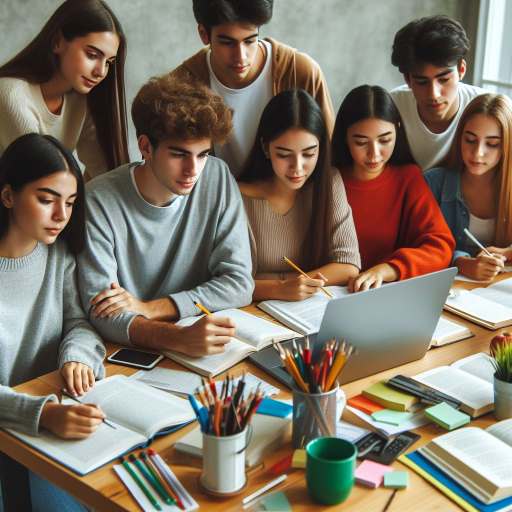NEET Group Study Dynamics Maximizing Collaboration and Learning in Study Groups.
Table of Contents
- Benefits of Group Study for NEET Preparation
- Challenges of Group Study in NEET Exam
- Strategies for Maximizing Collaboration and Learning
- Conclusion

It takes commitment, tenacity, and efficient study techniques to prepare for the National Eligibility and Entrance Test (NEET). Even though a lot of students choose to study alone, group study can be a useful strategy for improving academic performance and encouraging cooperation. We will examine the dynamics of NEET group study in this blog, emphasizing the advantages, difficulties, and methods for enhancing cooperation and learning in study groups.
Benefits of Group Study for NEET Preparation
- Enhanced Understanding: Group study fosters the sharing of thoughts, viewpoints, and justifications, which helps participants grasp difficult subjects on a deeper level.
- Motivation and Accountability: Studying in a group offers motivation and accountability since participants support one another in setting and achieving goals for their studies.
- Division of Workload: Group members can teach each other and divide up the study material, which makes it easier to cover more ground in less time.
- Peer Learning: Peer-to-peer learning is made easier by group study, as participants can clear up questions, exchange insights, and benefit from each other’s strengths and shortcomings.
- Social Support: Studying in groups fosters a sense of solidarity and support, which lessens the stress and feelings of loneliness that are frequently connected to getting ready for a test.
Challenges of Group Study in NEET Exam
- Distractions: Off-topic conversations, flirting, and electronic diversions can all be sources of disruption during group study sessions.
- Coordination: Finding a time that works for group study sessions and juggling schedules can be difficult, particularly for participants who have competing obligations.
- Group dynamics: Disparities in study preferences, learning styles, and personalities among group members can cause disagreements or ineffective study sessions.
- Dependency: Since some group members may passively rely on others for answers, an excessive reliance on group study may impede individual learning and the development of critical thinking skills.
- Unequal Contribution: In some situations, some group members may feel excluded or disengaged while others may dominate conversations or contributions.
Strategies for Maximizing Collaboration and Learning in NEET Study Groups
- Establish Clear Goals and Expectations:
- Establish the goals and purposes of the study group, including studying particular subjects, working through practice questions, or going over challenging ideas.
- Set ground rules for group participation, communication, and respect for differing viewpoints.
- Create a Structured Study Plan:
- Create a thorough study plan that includes the subjects to be studied, the resources to be used, and the due dates for any assignments or practice exams.
- To guarantee balanced study sessions, set down designated time intervals for group talks, review sessions, and solitary study.
- Foster Active Participation:
- Urge every group member to actively engage in conversations, pose inquiries, and share their knowledge and experiences.
- Make sure that group members are equally involved in study sessions by rotating leadership positions or study session facilitators.
- Use Diverse Study Methods:
- To accommodate varying learning styles within the group, incorporate a range of study techniques and materials, including mnemonics, interactive quizzes, online movies, and textbooks.
- To improve comprehension and memory of the material, try out various study strategies like idea mapping, group problem-solving, and peer teaching.
- Maintain Focus and Accountability:
- Reduce disruptions during study sessions by establishing boundaries and specific areas that are free from noise or disturbances.
- Assume responsibility for one another’s completion of duties, active participation, and adherence to the study plan and deadlines.
- Provide Constructive Feedback:
- Create a welcoming environment where group members can freely share and receive helpful criticism on their comprehension, study techniques, and contributions.
- Make use of feedback sessions to pinpoint areas that require work, dispel misconceptions, and modify study plans as necessary.
- Balance Social Interaction with Academic Focus:
- While interacting with others and developing a rapport are valuable components of group study, make sure that the majority of study sessions are centered toward your academic objectives.
- Study sessions should include quick breaks or social activities to keep group members motivated and reenergized.
Conclusion
With the help of NEET study groups, students can prepare for exams in a dynamic and cooperative manner and use the group’s knowledge, inspiration, and encouragement to succeed academically.
Study groups can overcome obstacles and optimize their potential for collaborative learning by putting excellent communication, organization, and study practices into practice.
NEET study groups, whether they be conducted in-person or virtually, offer students a priceless chance to improve their knowledge, drive, and self-assurance as they pursue their academic objectives.

